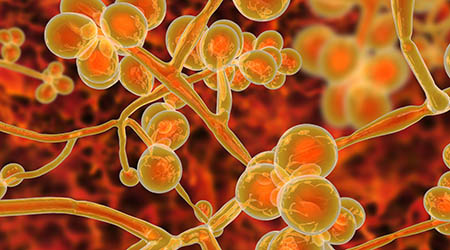C. auris is drug resistant and sticks to surfaces
Candida auris, or C. auris, is a superbug, a pathogen that can evade drugs made to kill it — and early signs suggest the COVID-19 pandemic may be propelling infections of the highly dangerous yeast. That is because C. auris is particularly prominent in hospital settings, which have been flooded with people this year due to the coronavirus.
The superbug sticks stubbornly to surfaces such as sheets, bed railings, doors, and medical devices — making it easier to colonize skin and pass from one person to another. Moreover, patients who have tubes that go into their body, such as catheters or ones for breathing or feeding, are at the highest risk for C. auris infections, and these invasive procedures have become more common because of the respiratory failure associated with COVID-19.

“Unfortunately, there have been places where we’ve seen a resurgence of C. auris,” says Tom Chiller, head of the mycotic diseases branch at the U.S. Centers for Disease Control and Prevention (CDC). “We’ve also seen it get into some of the acute care hospitals and also into some COVID-19 units…the concern there is that once it sets up shop in a place, it’s hard to get rid of.”
Last year, the CDC classified C. auris as one of the biggest drug resistance threats in America. Now, although it’s too early to confirm a direct knock-on effect, the U.S. has recorded 1,272 confirmed cases of C. auris in 2020, a 400 percent increase over the total recorded during all of 2018, the most recent year with available data.
The shortage of medical equipment, including PPE (gowns and gloves), triggered by the coronavirus outbreak may be helping to spread dangerous germs within healthcare facilities, according to officials who warned of a potentially deadly fungus in a Los Angeles County healthcare facility.
In a case report dated Jn. 8, 2021 in Morbidity and Mortality Weekly Report (MMWR), investigators with theCDC and the Florida Department of Health describe an outbreak of C. auris in a COVID-19 specialty care unit of an acute care hospital in Florida.
After the hospital alerted Florida health officials about four C. auris infections in the unit in July 2020, staff conducted a unit-wide point-prevalence survey from Aug. 4 through Aug. 18 to identify additional patients colonized with the pathogen. The results showed that, among 67 patients admitted to the unit, 35 (52 percent) were positive, and six later had clinical cultures that grew C. Auris.
Eight of the colonized patients died within 30 days of screening, but it is unclear whether the superbugcontributed to those deaths.
Investigators concluded that use of multiple layers of gloves and gowns by healthcare workers, and repeated doffing and donning of secondary layers, may have led to contamination of base layers, which in turn could have contributed to C. auris transmission. They also suggest lapses in cleaning and disinfection of shared medical equipment, along with lapses in adherence to hand hygiene, may have played a role.
According to the CDC update, this superbug is known to sweep through healthcare settings. Early detection is critical. Nearly half of the first 122 patients identified in the U.S. by the CDC were in the same wards as patients already tested positive for the fungal infection. Epidemic links were found consistently, and environmental testing of patients’ rooms identified the pathogenic fungus from mattresses, windowsills, chairs, infusion pumps, countertops, floors, IV poles, air vents and other surfaces.
J. Darrel Hicks, BA, MESRE, CHESP, Certificate of Mastery in Infection Prevention is the Past President of the Healthcare Surfaces Institute. Hicks is nationally recognized as a subject matter expert in infection prevention and control as it relates to cleaning. He is the owner/principal of Safe, Clean and Disinfected. His enterprise specializes in B2B consulting, webinar presentations, seminars and facility consulting services related to cleaning and disinfection. He can be reached at [email protected] or you can learn more at www.darrelhicks.com.
